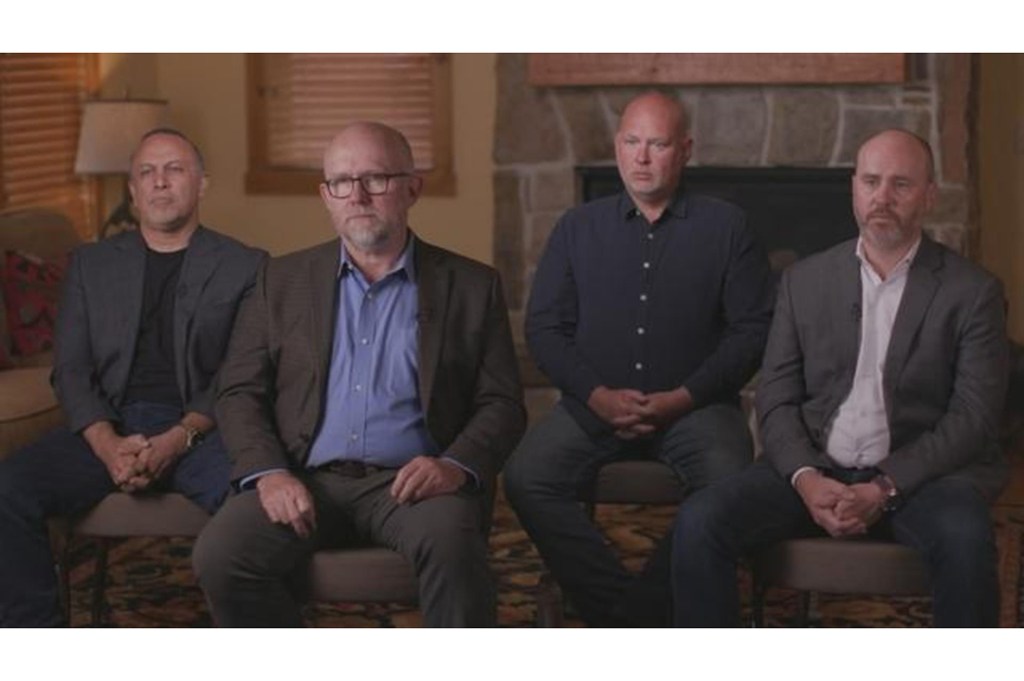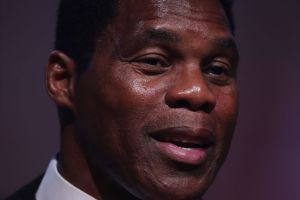Showtime’s latest docuseries follows the Lincoln Project, the anti-Trump Super PAC, during the end of the 2020 campaign as the organization blew up in notoriety. The series displays the shallowness within modern day American politics. What starts as a hero’s journey, with former Republican consultants disavowing the racism of the GOP, proves to be more of a Greek tragedy as one-by-one they ultimately become everything they claimed to hate.
The show centers around Lincoln Project co-founders — Reed Galen, Jennifer Horn, Mike Madrid, Ron Steslow, Steve Schmidt and Rick Wilson — as well as principal members of the organization such as Keith Edwards, Sarah Lenti, Conor Rogers, Stuart Stevens and Ryan Wiggins. All assemble at the organization’s headquarters in Park City, Utah, as if in a knock-off version of the Avengers; instead of superheroes, we see mostly middle-aged men with stomachs distending dangerously below belt buckles and a few female enablers cutting viral commercials.
The first few episodes of the show tease a story of redemption. Madrid alludes to this by discussing Michelangelo’s painting of the Final Judgment separating those who choose good from those who will suffer in eternal damnation. This is part of an endless series of foreshadowing as to where the organization and its members would ultimately descend. Galen talks about how much money the group is raising from mostly small-dollar donors. They also briefly describe how much of the group’s independent expenditures are being used to either engage in social media spending, to turn out more small dollar donors, or in the DC media market to annoy Trump so he will tweet about them, off which they can raise more funds. Lenti describes how quickly the organization has grown and complains about the number of interns being recruited to the Lincoln Project by John Weaver, who’s absent most of the series. Lastly, Edwards, an openly gay man who runs the group’s Twitter account describes how he got his job from reaching out to Weaver via Twitter direct message.
For the first four-and-a-half episodes you see the making of the organization, the drive to raise money and engage with certain demographics to flip the Electoral College. Madrid is almost singularly focused on trying to make sure Hispanics turn out in full force against Trump. For the most part though, the first three-and-a-half episodes become a series of commentary of political events from the perspective of members of the Lincoln Project. They discuss how they ultimately came to realize the GOP was a racist institution — but thanks to mass immigration and Covid, they believe they don’t have to rely on white voters to win important states such as Arizona and Georgia.
It’s not until halfway through episode four of this five-part series that the audience sees cracks within the organization: when Axios breaks the story that the Lincoln Project is becoming a media business. Several key players within the organization were blindly unaware of this development. During a development meeting, Schmidt promises all the co-founders that they can eventually make a lot of money, even floating the idea of “generational wealth.” While they’re excited by the prospect, several members grow disillusioned and the group splits into two factions with Horn, Steslow and Madrid on one side and Schmidt, Wilson, Galen and Stevens on the other.
Finally, Horn and Madrid demand to see the books on where all the money is going… but Wilson and Galen refuse. Internal battles rage as Madrid and Horn increasingly begin to ask for oversight and Wilson, Schmidt and Galen accuse them of wanting a cut of the money.
“As cofounders we expected to be looped in on what was going on. Mike and Ron wanted an accounting of the finance and Reed and Steve were unwilling to give it to them. I became suspicious about where did the money go,” Horn says during the fourth episode of the show. She continues:
First time I looked at our FEC reports was the first time I saw in print how much money went to Summit Strategies (owned by Reed Galen): it was $27 million. I started recreating in my head who did what, all the staffers in the Lincoln Project are accounted for in the FEC reported. They weren’t getting paid through Summit, they were getting paid directly, you can see that. All our ad buys are all accounted for and there’s still $27 million that went to Summit Strategies. Summit Strategies did not serve a function to the campaign, they did not have a staff of employees that worked for the Lincoln Project, they were not producing the ads, they weren’t developing the digital, Summit Strategies was Reed Galen. The question was are just the four of them splitting up the money?
Galen would deny this, insisting that spending that much money on his company went to functions but then he questions why Horn didn’t question how much money SES Strategies (owned by Schmidt), TUSK Digital (owned by Steslow) or GrassrootsLab (owned by Madrid) earned. The entire group become piranhas on a hunt for their share of money and what each believe they deserve. One-by-one, early founders start dropping out and Wilson says they could have earned more had they stayed.
The amount the group spent during this time was truly astounding. The FEC reports show that after the presidential election, from November 24, 2020 to December 16, 2020, the Lincoln Project spent $7.5 million with $6.93 million going to operating expenses. Just $597,696 went to political expenditures. During this time Schmidt’s company received $1.5 million, Steslow’s earned $543,000, Madrid’s earned $530,000 and Galen’s took in $433,000. This is at the same time members were leaving the organization and looking for an exit ramp.
While the money was one controversy that tore the organization in half, the other was about the drop. The New York Times reported on January 31, 2021 that John Weaver messaged at least twenty-one young men including one minor, promising them jobs and career advancement in exchange for sex.
Members of the Lincoln Project are beside themselves at the news; the co-founders insist that they had absolutely no idea what was going on. Yet that is completely dismissed by other members of the organization, including Lenti who says she emailed Galen back in March about Weaver’s activities. Conor Rogers says explicitly:
The Lincoln Project knew that John Weaver was doing this in June 2020, they continued to put him in contact and hire his interns until October 2020. I warned them about this in a three-page email about fifteen incidents of sexual harassment by John Weaver. I was told that there was an investigation and he was sidelined… I did not realize the degree of the deception and the coverup until October when he was back involved and at that point it was five days before the election… John has been doing this people for thirty years, he did a version of it to me.
At that point the entire organization falls apart. More members quit or are fired and regret their involvement with the Lincoln Project. Yet this part of the show, which is arguably the reason anyone tunes in, shows the weakness of the filmmakers: they let the main characters craft their own narratives with little pushback, despite their versions of events being entirely divorced from reality.
The truth is that the New York Times story on January 31 came twenty days after I broke the original story on John Weaver in the American Conservative. Just four days later Weaver admitted to these messages in a story covered by Axios, but insisted they were consensual, despite evidence to the contrary. In the Axios puff piece, written by Lachlan Markay, Weaver announced he would not be returning to the Lincoln Project but said any accusations or smears written about him were “categorically false.” A spokesman for the Lincoln Project said that “John’s statement speaks for itself.”
This was just the latest example of the Lincoln Project hoping to sweep a controversy under the rug, with the help of their friends in the media.
When the New York Times story broke two weeks later, the founders of the Lincoln Project insisted they had never heard of the allegations before, despite knowing about my story earlier in the month. My reporting, as well as that of other journalists including Amanda Becker, was later confirmed in the docuseries that the entire organization was aware of Weaver’s actions.
This isn’t the only time that the series allowed the Lincoln Project to misrepresent the truth. In the first episode, Madrid is portrayed as a political genius who was working with celebrities such as John Leguizamo to turn out Latinos against Trump. Pew Research Center found that Democrats saw their advantage with Latinos shrink by twenty-six points from 2016 to 2020. Yet, at the end of the show Madrid is seen sitting next to Horn congratulating themselves on their work taking down Trump. They also fail to mention how the Lincoln Project failed in eight of the ten Senate races into which they poured more than $10 million.
It’s all an illusion. The Lincoln Project was, is, and always will be, a grift, one that a middle-aged predator used to groom young men for sex. At the end of the day, the organization and its co-founders are exactly what they accused Trump and the Republicans of being. They manipulated, used and, at times, abused everyone around them for fame, money and power.
Does it matter though? As they say, there aren’t politicians left with honor or character, no one holds a candle to Abraham Lincoln — and so with America’s political system being almost purely Machiavellian, the Lincoln Project carries on. People still donate millions of dollars and the few co-founders left use that as they see fit. The grift continues because what the Lincoln Project lacks in integrity, they make up for in the illusion that they are effective.


















